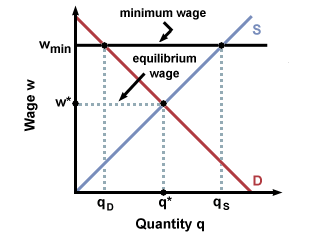Maybe it's that good old government conditioning making me think otherwise, but I don't see how this is an absolutely horrible thing.
When I think of "no minimum wage" I think of China, El Salvador, Honduras, etc. where working conditions are absolutely horrible. I can only imagine that in a free market with no minimum wage we'd have sweatshops all over the country. We'd have people working in piss-poor working conditions for practically nothing. Even the possibility of, like in Honduras, where the sweatshops force their young teenage girl workers to take a birth control pill everyday before entering so that they don't get preggo and take time off of work for the baby. They also hit the workers if they're not going fast enough and sometimes rape them.
This may be an extreme extrapolation of what could happen here, but I still think that a minimum wage is somewhat necessary otherwise we'd have people working at Wal-Mart for $1.20 an hour, working at McDonalds for $0.60 an hour, working at a steel factory for $3 or 4 an hour.
Hold on a second................(thinking)..............
You know what? Something just dawned upon me when I was typing in those wages.
Tell me if I'm right: We've all heard of the "old days" when our great-grandparents made, lets say, a dollar a day for a lot of work, but it seems as if that was actually a livable wage. So am I right when I say it's the devaluation of the dollar that makes low wages sound "low"? I think I just taught myself another lesson in the free market. In order to have a free market with no minimum wage, we'd have to not have a Federal Reserve printing money out of thin air, devaluing it, that way a $2.00 an hour wage would actually be equivalent to a 10 dollar salary.
Am I finally getting it? Any more insight?
Site Information
About Us
- RonPaulForums.com is an independent grassroots outfit not officially connected to Ron Paul but dedicated to his mission. For more information see our Mission Statement.




 Reply With Quote
Reply With Quote


 ->>>>
->>>> 




Connect With Us